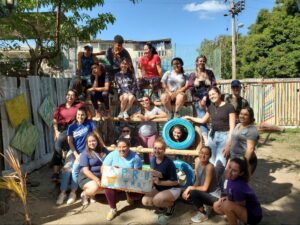
Group Exchange Language Goals
Experiencing an exchange program is a transformative and life-changing opportunity where students can immerse themselves in a different culture, broaden
You are on our High Schools -> Group Exchanges pages!
As a teacher responsible for deciding which is the best option for your students, it is crucial to weigh the pros and cons of each type of accommodation available for students during group exchange programs.
With YOU in mind, we’ve put together a little explanation and, the advantages and disadvantages of each option, you to make an informed choice that aligns with your students’ requirements and enhances their overall experience during the group exchange program.

Living with a host family when participating in a study exchange abroad program refers to the arrangement where a student resides with a local family in the host country. This accommodation option involves sharing a home with the host family, typically for the duration of the program.
Host families are usually carefully selected by the study abroad provider or organization, and students are placed based on their compatibility and requests.
Living with a host family during a study exchange abroad program can be a rewarding accommodation option. It offers numerous advantages for students, starting with the immersion cultural experience that living with a host family provides, allowing students to learn firsthand about the local customs, the authentic local cuisine and dietary habits, and overall, everyday life.
Interacting with the host family offers the opportunity to practice the language since the conversations are often in the country’s native language.
Another advantage of living with a family is the environment the students are in, they are supported and they are provided with guidance and assistance whenever needed. In addition, building close relationships with the members of the host family can lead to great insight into the country and potential life-long friendships.
Living with a host family provides an unparalleled opportunity to experience local customs, traditions, and everyday life firsthand, but there may be some obstacles. For starters, adjusting to a new family, household rules, and cultural differences, can be a challenge and it requires time and effort. Along the same lines, living with a host family means sharing living spaces, which might limit personal privacy compared to other accommodation options.

Staying in a designated place, such as a hostel, an apartment, or a student lodging, during a study exchange abroad program refers to the arrangement where students reside in a pre-determined accommodation facility rather than with a host family.
Unlike when living with a host family, staying in a designated place provides students with greater independence having more control over their routines and personal space. Accommodations such as hostels and student lodging are usually filled with a vibrant social environment and opportunities to connect with other students and travelers from all over the world.
Additionally, hostels, apartments, and student lodgings often provide amenities such as communal spaces, study areas, laundry facilities, and sometimes even gym facilities, enhancing the overall comfort and convenience of students.
Unlike living with a host family, staying in these accommodations usually offer fewer opportunities for cultural immersion, and they may not provide the same level of emotional support, guidance, and assistance that a family can.
Additionally, depending on the type of accommodation and the location, some of these options may be more expensive than living with a host family.
Solely applicable to university group exchanges

Some universities reserve some of their student dormitories or accommodation options for exchange students participating in study abroad programs. The purpose of these accommodations is to support the needs of international students during their time in a foreign country.
These accommodations vary depending on the university but mostly they are either on-campus dormitories or off-campus dormitories.
One of the most attractive things about living in a dormitory is that students can interact and connect with other students both from the host country and other international students, creating a community and engaging together in cultural exchange.
Additionally, dormitories commonly have resident advisors that offer guidance and support in academic matters, cultural shock, and other challenges the students may face.
As well as hostels, apartments, and student lodgings, dormitories often offer various amenities, such as common areas, study rooms, laundry facilities, and sometimes fitness centers.
Also, since most of the time dorms are located close to universities, students have easy access if they are taking classes.
Living in a dormitory means sharing living spaces, such as bedrooms and bathrooms, with other students, which results in dealing with some challenges like the lack of privacy and living in a lively and noisy environment due to the presence of many students.
In addition, to keep a safe environment, dormitories have specific rules and regulations that students are obliged to follow, and some of them may find these rules too restrictive or limiting.
In the line of having a lack of control over certain things when living in a dormitory, exchange students rarely have a say in terms of roommates or the specific area they are assigned to, which occasionally leads to incompatibility or a challenging adjustment between students.

Experiencing an exchange program is a transformative and life-changing opportunity where students can immerse themselves in a different culture, broaden

Group exchange programs are a great opportunity for fostering cross-cultural understanding and appreciation for other cultures. These programs offer students

Group exchange programs are life-changing experiences where students embark on transformative journeys, broadening their horizons and fostering cross-cultural understanding. But,

When planning and organizing a group exchange program for your students, one of the steps is to carefully consider the

When planning an exchange program, one of the first steps is to set the objectives of the experience. It will

The safety and well-being of students when they travel academically is one of the major concerns when choosing
Planning a group exchange?
Where should we send you the brochure?
Receive travel and education information directly in your inbox
Where should we send you it?
Receive your brochure
Where should we send you the brochure?